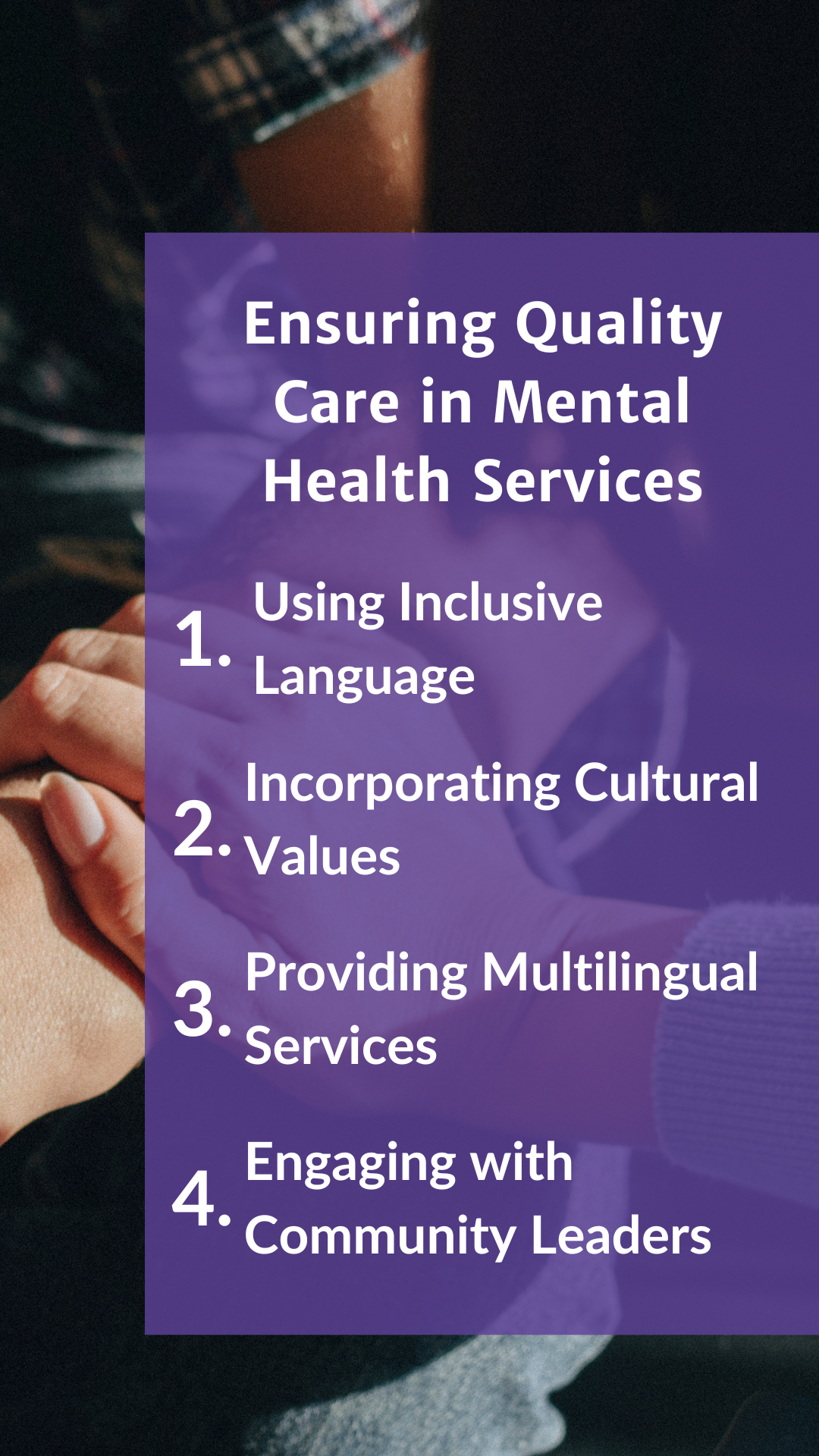Everyone deserves access to mental health services that truly understand their needs. Yet, for many, finding care that respects their cultural background and lived experiences can be a challenge. Quality therapy isn’t just about providing support; it’s about ensuring that care is both effective and equitable for all. In this article, we’ll explore what it takes to deliver inclusive mental health care, from dismantling biases to promoting culturally competent practices that better serve diverse communities.
The Importance of Mental Health Services
Mental health services, including therapy and counseling, play a fundamental role in helping individuals manage stress, trauma, and emotional difficulties. These services provide a safe space for exploring feelings, developing coping skills, and making sense of life’s challenges. High-quality care ensures that each person’s unique needs are addressed with sensitivity, compassion, and professionalism.
Yet, quality care means more than just scheduling therapy sessions; it’s about establishing a trusting relationship between clients and mental health professionals. Effective mental health services must take into account cultural and social contexts, making sure support is relevant and tailored to each individual’s circumstances. This is particularly crucial in communities where stigma or cultural differences can influence attitudes toward mental health.
Why Culturally Competent Care Matters
Culturally competent care is the foundation of effective mental health services. It involves understanding a client’s background, values, and traditions and integrating that understanding into the therapeutic process. Culturally competent therapists don’t just recognize cultural differences; they embrace them, adapting their approach to align with the client’s needs.
For example, some communities may value collective support over individual therapy or have distinct beliefs about mental health. Therapists who are culturally aware will honor these perspectives and use them to shape their care. This approach enhances trust and makes therapy more meaningful and effective for diverse clients.
Addressing Stigma in Ethnic and Cultural Communities
Mental health stigma is a significant barrier, especially in ethnic and cultural communities where mental health concerns are often misunderstood or minimized. Overcoming stigma requires education, empathy, and open dialogue. Mental health professionals can help by fostering conversations that normalize seeking help and highlighting that therapy is a tool for empowerment, not a sign of weakness.
To challenge these stigmas, mental health services must be approachable, relatable, and free from bias. This means creating a space where all individuals feel heard, respected, and safe to express their struggles without fear of judgment. By addressing cultural stigmas head-on, mental health professionals can encourage more individuals to seek the support they need.
The Role of Anti-Oppression in Mental Health Care
Anti-oppression work is at the heart of equitable mental health services. Systemic barriers, such as discrimination, socioeconomic inequality, and language differences, often prevent marginalized communities from accessing quality care. Mental health professionals must actively work to dismantle these barriers, ensuring that all individuals receive the care they deserve.
Here are a few examples of oppression in mental health care:
- Racial Bias in Diagnosis: Black individuals are more likely to be misdiagnosed with severe disorders like schizophrenia instead of depression or anxiety, impacting treatment quality.
- Cultural Incompetence: Therapists may dismiss culturally significant practices, like Indigenous healing rituals, if they are unfamiliar, leading to ineffective or invalidating care.
- Language Barriers: Non-English-speaking clients often face miscommunication and misdiagnosis due to a lack of services in their native language, affecting treatment outcomes.
- Economic Disparities: Low-income individuals may struggle to access consistent therapy due to high costs, resulting in limited or inconsistent care.
Integrating Social Justice into Therapy
Therapists who prioritize social justice recognize that mental health isn’t just about individual well-being; it’s about addressing the larger social and cultural factors that affect a person’s life. This means acknowledging how discrimination, poverty, and systemic inequalities can contribute to mental health struggles. Therapists who practice from a social justice perspective offer more holistic care, helping clients understand and overcome both personal and societal challenges.
In therapy sessions, social justice might involve exploring how a client’s identity impacts their experiences or addressing how external pressures contribute to their stress. This approach empowers clients to not only work through their emotional struggles but also to better understand the broader context that shapes their lives.
Promoting Accessibility and Inclusion in Mental Health Services
For mental health services to truly be effective, they must be accessible and inclusive. This means removing the barriers that prevent people from receiving care, whether those obstacles are financial, geographic, or cultural. Proactive steps, such as offering teletherapy, sliding fee scales, and therapy in different languages, can make a significant difference in reaching underserved communities.
Accessibility also involves creating an environment where everyone feels welcomed. From the waiting room to the therapist’s office, the space should be inviting and inclusive, reflecting a commitment to diversity and respect for all backgrounds. By prioritizing accessibility, mental health professionals can ensure that their services are truly equitable.
Culturally Competent Strategies to Empower Communities
Empowering diverse communities requires more than just providing mental health services; it involves using culturally competent strategies to engage and uplift individuals. Some effective strategies include:
- Incorporating Cultural Values: Tailor therapy to honor the client’s cultural beliefs, integrating traditional practices and perspectives that make therapy more relatable and respectful.
- Using Inclusive Language: Adopt language that aligns with social justice and anti-oppression values. This creates a safe space for clients to share openly and honestly.
- Offering Family and Community Resources: Recognize that in many cultures, healing is collective. Providing family counseling, support groups, and educational resources can make therapy more accessible and culturally relevant.
- Engaging with Community Leaders: Partner with local organizations and respected figures to build trust within the community, reduce stigma, and provide tailored mental health education.
- Providing Multilingual Services: Ensure language is not a barrier by offering therapy in the client’s preferred language or through professional interpretation services.
Conclusion: Quality Care for All
Ultimately, quality mental health care is about more than therapy sessions; it’s about creating a space where all individuals, regardless of background, feel valued and understood. This requires a commitment to anti-oppression work, culturally competent practices, and social justice principles that empower every person seeking help.
At Mente Counseling, we are dedicated to providing inclusive, high-quality mental health services that prioritize both individual and collective well-being. Contact us today to discover how our tailored mental health services can help you or your loved ones achieve emotional well-being and a supportive path to healing.
FAQs
How to measure mental health services?
How can mental health services be improved?
How to make mental health services more accessible?
How can we increase awareness of mental health services?

